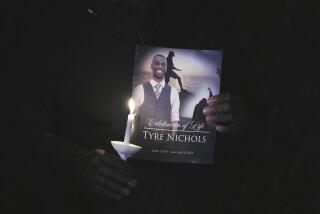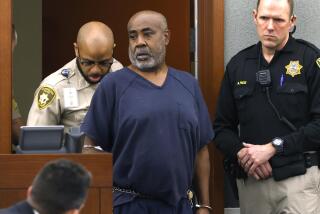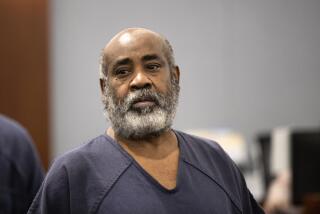Texas death renews debate over violent rap lyrics
Popular music is back in the courtroom--on a murder charge.
Six weeks after Time Warner Inc. and Ice-T pulled the controversial “Cop Killer” song off the market, an unprecedented legal battle over another album released by a Time Warner subsidiary promises to reopen the bitter national debate over artistic expression, free speech and corporate responsibility.
The case involves Ronald Ray Howard, a 19-year-old Texan who has been charged with murder following the shooting death last April of 43-year-old state Trooper Bill Davidson on a highway near Victoria, about 100 miles outside Houston.
Howard has told authorities that he was listening to a tape of rapper Tupac Amuru Shakur’s violence-laced “2PACALYPSE NOW” as he loaded his weapon, aimed it at the officer and pulled the trigger, sources close to the case said. Investigators recovered a copy of the “2PACALYPSE NOW” cassette from the tape deck of the stolen vehicle after the shooting.
The album, which has sold 400,000 copies, includes half a dozen songs that portray the killing of police officers--songs that Howard’s attorneys now claim influenced him to shoot the trooper.
Howard, an eighth-grade dropout on probation for car theft, was driving a stolen Chevrolet Blazer down Highway 59 on April 11 when Davidson, a highway officer with the state’s Department of Public Safety, stopped the vehicle to issue a ticket for a missing headlight.
Moments after being pulled over, the prosecution and defense agree, Howard shot Davidson in the neck with a 9 millimeter pistol. An eyewitness to the shooting called authorities immediately and a high-speed chase ensued. Howard was caught and, authorities say, confessed to the crime. Davidson died April 14 as a result of the gunshot wound.
In a separate action, the officer’s widow has filed a civil suit against the San Francisco Bay Area-based Shakur and his Interscope Records label, a Time Warner subsidiary. The suit charges that the label and the rap artist were grossly negligent in manufacturing and distributing music that incites “imminent lawless action.”
Linda Davidson’s lawyer, who has been promised assistance by an organization headed by former White House aide Oliver L. North, says the lyrics of the album read like “pages out of a cop-killing manual.”
Here’s a sample lyric from “Soulja’s Story,” one of several violent tracks on the album:
Cops on my tail, so I bail till I dodge them,
They finally pull me over and I laugh,
Remember Rodney King
And I blast his punk ass
Now I got a murder case . . .
. . . What the f --- would you do?
Drop them or let them drop you?
I choose droppin’ the cop!
Howard, who has been held in lieu of $1 million bond at Jackson County Jail in Edna, Tex., since the shooting, was unavailable for comment.
Jury selection is scheduled to start March 15 at the University of Texas School of Law in Austin. No court date has been scheduled for the civil case, but it will not take place until after the criminal trial. The outcome of the murder case is also likely to affect the civil case.
The two cases will most certainly renew criticism of the record industry and rekindle a free speech debate over rock and rap lyrics.
In past music-related wrongful death civil cases against heavy metal artists Ozzy Osbourne and Judas Priest, judges have ruled that controversial song lyrics are protected by the First Amendment. Several obscenity cases involving Miami rappers 2 Live Crew were also dismissed or defeated on free speech grounds in recent years.
Even if Time Warner prevails in the Texas civil case, record industry representatives expressed concern that the costly legal battle and negative press facing the New York-based media giant in the months ahead will only intensify criticism of the entertainment business--which has grown increasingly more cautious about releasing so-called “gangsta” rap records.
“Imagine what a nightmare it would be if a preposterous suit like this ever succeeded in court,” said Jason Berman, president of the Recording Industry Assn. of America, the Washington organization that represents the nation’s major record labels. “What if everyone who committed a crime could offer the defense that a record or a movie or a book influenced his actions? A ruling like that would not only restrict free speech in the future, it would turn the concept of what we consider to be artistic freedom completely on its head.”
Ron DeLord, president of the Combined Law Enforcement Assn. of Texas, the police group that initiated the boycott against Time Warner over Ice-T’s music, took an opposite view.
“In every other industry, companies are held liable for dangerous products they produce,” he said. “If it’s illegal to produce physical pollution, it ought to be illegal to produce mental pollution.”
Since the Ice-T/”Cop Killer” controversy last July, record industry firms have beefed up lyric review committees to screen troublesome, violent and sexually explicit rap projects before they get recorded. Following Ice-T’s decision to pull “Cop Killer,” Tommy Boy Records, MCA Music Entertainment and A&M Records each stopped production of at least one controversial rap record.
Howard’s attorneys plan to introduce the music argument in the penalty phase of Howard’s trial. If he is convicted, they hope to prove that music can affect the actions of a person committing a crime--in the same way alcohol or drugs can--in order to win a sentence of life in prison for Howard instead of death.
Robert E. (Bobby) Bell, the Jackson County district attorney, will argue that Howard deserves the death penalty.
“Frankly, it doesn’t matter to me whether Tupac told him to kill somebody or whether Charlie Manson or the devil told him do it,” Bell said. “There isn’t any doubt in my mind that this young man is responsible for his conduct.
“But the big question here is whether he should be put to death or whether he should get life imprisonment for the crime? Can violent music, like drugs or alcohol, be considered a mitigating factor in the shooting? To my knowledge, there has never been a murder trial before where a jury has had to answer that question.”
Al Tanner, Howard’s court appointed attorney, said he intends to summon psychiatrists and sociologists during the punishment phase of the trial to deliver expert opinions on whether or not violent entertainment can alter the behavior of impressionable young people.
“Without the music riling him up,” said Tanner, “I do not think that this incident would have occurred.”
In the civil suit, Davidson’s widow intends to test the limits of free speech, holding Time Warner accountable for manufacturing music containing constitutionally unprotected “fighting words”--a legal term that is frequently applied to inflammatory language intended to provoke illegal acts, such as encouraging someone to kill a law enforcement officer.
“Our goal is to punish Time Warner and wake up the executives who run the music business,” said Jim Cole, the attorney representing Linda Davidson.
Davidson is seeking unspecified damages to compensate for her husband’s death.
Shakur--a nationally known rapper and actor who was in the 1991 film “Juice” and will star opposite Janet Jackson in director John Singleton’s upcoming “Poetic Justice”--declined to be interviewed.
Interscope Records, the Los Angeles label that released Shakur’s “2PACALYPSE NOW” album, also declined comment. The head of Interscope is noted Hollywood movie executive Frederick W. (Ted) Field, a leading financial donor to the Washington-based anti-censorship group, People for the American Way. But Austin attorney James George, who is representing Time Warner in the civil case, said he thought the lawsuit was motivated by reasons that have nothing to do with rap.
Time Warner is expected to argue that Davidson’s shooting had nothing to do with Shakur’s music, but was prompted by a history of crime and social problems that haunted Howard from childhood.
The widow’s civil case has already attracted the attention of North, the ex-Ronald Reagan White House aide and Iran-Contra figure, whose Freedom Alliance joined this summer’s effort to boycott Time Warner and stop the sale of Ice-T’s “Cop Killer.”
Excerpts From the Album
The album “2PACALYPSE NOW” includes half a dozen songs that portray the killing of police officers . Here are lyrics from various songs:
Tired of being trapped in the vicious cycle,
If one more cop harasses me I just might go psycho,
And when I get him, I hit him with the bum rush,
Only a lunatic would like to see his skull crushed,
Yo, if you’re smart you’ll really let me go “G”
*
So make your move and act like you wanna flip,
I’ll fire 13 shots and pop another clip,
I brain lock, my Glock’s like a . . . mind,
The more I shot, the more . . . drop,
And even cops got shot when they rolled up
*
9 millimeter kickin’ thinkin’ about what the streets do to me
cause they never taught peace in the black community,
All we know is violence, do the job in silence,
Walk the city streets like a rat pack of tyrants,
Too many brothers barely headed for the big pen
More to Read
Start your day right
Sign up for Essential California for news, features and recommendations from the L.A. Times and beyond in your inbox six days a week.
You may occasionally receive promotional content from the Los Angeles Times.






